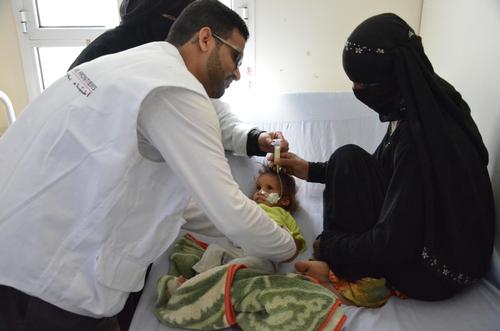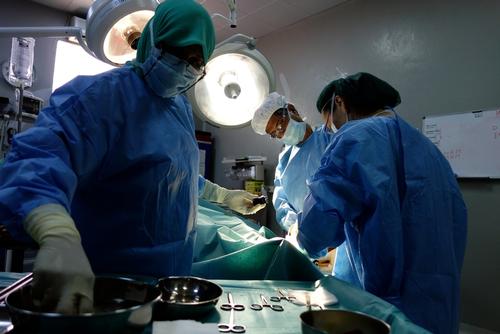First published in MSF's International Activity Report 2015, available to download below.
Life has been a struggle for the Yemeni people for many years, due to poverty, chronic malnutrition and a weak healthcare system, but the situation deteriorated significantly during 2015 as the conflict escalated.
Violence first erupted over three years ago when President Saleh and his General People’s Congress party left office. The Ansarallah/Houthi party, which is associated with Saleh’s regime, is now in conflict with an alliance made up of the southern Yemeni independence movement, Islamist groups, local tribal alliances and jihadist forces that are backed militarily by a Saudi-led coalition comprising other Gulf countries and western powers.
War is being waged to determine who will control the country. The international coalition launched an aerial bombing campaign in March, and as the strikes intensified, more and more people were displaced and access to healthcare became increasingly difficult.
At this time of immense medical and humanitarian needs, however, most aid agencies present in Yemen evacuated their international staff to Amman in Jordan.
No different from others in its initial reaction, MSF also moved a large number of its international team out of Yemen but made the decision to keep key staff in both Sana’a and Aden, while also mobilising additional people with experience in conflict settings. This meant that medical and logistical expertise could be deployed in a matter of days.
The Saudi-led coalition imposed a weapons embargo at the beginning of the conflict, which blocked most ships and planes from delivering goods to the country. This disrupted supplies of medicines and fuel, which in turn forced many health facilities to close at a time when the number of civilian casualties had been rising. The clinics that are still open are running at low capacity to save on fuel.
In April, the United Nations Security Council approved this punishing practice, although Yemen had depended heavily on imports even before the conflict.
Despite the blockade and the destruction of the country’s main airports, however, MSF negotiated with local authorities and the Saudi-led coalition to continue supplying international staff and tonnes of medical supplies and drugs to Yemen by flying chartered planes into Sana’a and sending ships to Aden.
With a supply route in place, MSF continued to operate its surgical trauma centre in Aden and treated patients from both sides of the conflict. The project experienced some security incidents but its neutrality was relatively well respected by ground forces, even when fighting occurred nearby.
Patients came to the facility from Lahj governorate and from districts across the city, and the team performed more than 6,000 lifesaving surgical interventions in 2015.

In response to an upsurge in fighting, MSF opened a new project in Taiz in the summer. Medical supplies were donated to a number of hospitals and emergency rooms in the city and across frontlines. Staff saw an increase in the number of patients with conflict-related injuries towards the end of the year.
In November, also in Taiz, MSF opened a 100-bed mother and child hospital, which operates as a key obstetrics, gynaecology and paediatrics referral centre
in the war-torn city. The team also scaled up their activities in existing projects in northern governorates such as Sa’ada, Amran and Hajjah.
External restrictions like the blockade were not the only hurdles faced by Yemenis in need of urgent medical assistance this year: within an increasingly divided country and with shifting frontlines, people delayed their visits to health facilities to avoid passing through dangerous checkpoints, and in some places medical facilities were deliberately targeted in aerial attacks.
In October, an MSF-supported hospital in Haydan was destroyed by an airstrike, and in December, nine people were wounded when an MSF clinic in Taiz was
hit. There was a subsequent reduction in the availability of healthcare in these locations, as MSF activities could not restart immediately.
These targeted attacks on health facilities have further complicated emergency medical assistance, as they have fostered a climate of fear, and many Yemenis are now too afraid to go to hospital for treatment.
The international emergency response to the crisis has been limited in its scope and impact – some say no better than a sticking plaster. More needs to be done by humanitarian organisations – the herculean task of providing care for the Yemeni people cannot be left to the few currently working in the country.
Field-experienced aid workers and good-quality humanitarian leadership are required to bring assistance to vulnerable communities beyond frontlines and partisan differences.
There are risks for aid workers in Yemen, but the needs are great and some organisations, including MSF, have shown that it is possible to work effectively in the country.
However, it is true that all the goodwill in the world will achieve nothing if the warring factions do not find ways to minimise the suffering of Yemeni civilians and decrease the levels of violence in the country. Truces or more comprehensive ceasefires should be encouraged to make it easier for local
communities to procure basic supplies and seek out medical consultations.



